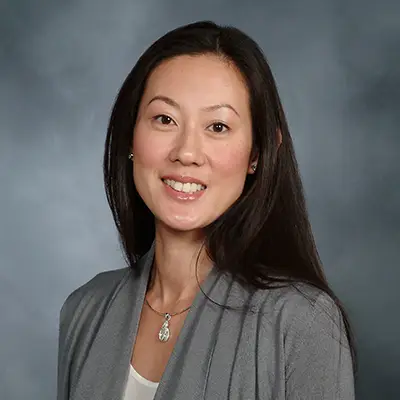In 2023, 48% of physicians in the United States reported experiencing symptoms of burnout according to the American Medical Association. While this is significantly lower than previous years (63% in 2021 and 53% in 2022), it still reflects a significant issue in medicine. At New York-Presbyterian and Weill Cornell Medicine, pediatric gastroenterologist Kimberley Chien, MD, is working to improve burnout among her colleagues, both at the hospital and around the country.
Below, Dr. Chien discusses two surveys she worked on with the North American Society of Gastroenterology, Hepatology, and Nutrition (NASPGHAN) to assess burnout and wellness practices among pediatric gastroenterologists and hepatologists and offers advice for those who are feeling the effects of burnout.
What made you interested in studying burnout among pediatric gastroenterologists and hepatologists?
The workplace is a very important entity in which we spend most of our lives. Physicians know how to work hard, that’s not a problem for us. However, if your workplace isn’t enjoyable, you don’t feel appreciated, and there isn’t camaraderie, that can lead to job dissatisfaction and burnout.
Burnout has been studied widely in gastroenterology as well as in other subspecialties. However, investigation and understanding by pediatric gastroenterology and hepatology have been slow. I have been on NASPGHAN’s Professional Development Committee over 10 years and now serve as the chair. In doing so, I have developed a significant interest in the physical and emotional well-being of those in my field. Understanding physician burnout in pediatric gastroenterology is important to me so that I can help organizations become aware of the issue, help create solutions to prevent further burnout and encourage physician wellness. My ultimate goal is to help colleagues feel happy and satisfied with their careers.
NASPGHAN conducted two surveys, and you were the first author on both publications sharing the results. What were the goals of the surveys?
The leaders at NASPGHAN felt it was important to address burnout and bring transparency to physician workload and practice management. The first survey we conducted was developed to assess the current status of our workforce. We know that adult gastroenterologists, endoscopists, and hepatologists report an overall burnout rate of 35%-49% and general pediatricians report 30%-38%. However, the rate among pediatric gastroenterologists and hepatologists is unknown. That’s what prompted us to conduct this survey. This survey was sent to the NASPGHAN membership of practicing gastroenterologists and hepatologists.
The second survey was designed to look at practice structures and what the physician workload was like so we could also understand what the current workforce is experiencing in their daily life. We also sought to understand what types of wellness activities practices engage in. Not only is it important for practicing gastroenterologists and hepatologists to have access to practice data, but it’s useful for pediatric residents and pediatric gastroenterology fellows as they make decisions about their futures. Therefore, we focused this survey on practice and academic division directors.
We found that 33% of respondents experienced overall burnout as measured by two domains from the Maslach Burnout Inventory – emotional exhaustion and depersonalization. This is comparable to reports of burnout in primary care pediatricians and other pediatric subspecialists.
— Dr. Kimberley Chien
What were the key findings from the surveys?
In the first survey, we found that 33% of respondents experienced overall burnout as measured by two domains from the Maslach Burnout Inventory – emotional exhaustion and depersonalization. This is comparable to reports of burnout in primary care pediatricians and other pediatric subspecialists.

Survey results show that 33% of respondents report experiencing burnout, with females and early career gastroenterologists at the greatest risk.
More specifically, 28.8% reported high emotional exhaustion and 17.5% reported high depersonalization. We found that those who were particularly at-risk for burnout were females and early career gastroenterologists under the age of 44 years. It’s important to be aware that females may be at greater risk because females are encompass a significant part of the pediatric workforce. Younger faculty may be at risk due to the pressures of starting out in their career – high clinical volumes, more on-call coverage, and higher stress levels when caring for complex cases contributing to the pressures.
Further examination revealed that insufficient nursing and administrative support, increased patient complexity and patient load/demands, excessive on-call coverage, and electronic health record use contributed to high emotional exhaustion and burnout. Insufficient administrative support, increase patient complexity, and excessive on-call coverage contributed to high depersonalization.
In the second survey, we found out interesting information about gastroenterology practices:
- 68% of respondents reported using work relative value units (wRVU) to determine expectations for faculty members
- 64.7% reported their target for wRVU was 4,000-5,000 for 1.0 clinical physician full-time equivalent (cFTE)
- 36% reported eight clinical and/or endoscopy sessions per week for 1.0 cFTE
- 32% reported seven clinical and/or endoscopy sessions per week for 1.0 cFTE
We also learned about the inclusion of other providers within the practice, like advanced practice providers (APP), nurses, medical assistants, dietitians, social workers, and psychologists. The majority of practices used APPs; however, the ratio was one APP for every 2.5 physician cFTE. The nursing ratio was 0.80 nursing FTE for every physician cFTE. The MA and dietitian ratios were both reported at approximately one for every 3.5 physician cFTE.. Eighty percent of divisions incorporated at least one social worker and one research assistant, and 60% incorporated at least one psychologist and one case manager.
Lastly, we found that 80% of divisions provided didactic lectures on physician burnout and wellness. Sixty-eight percent incorporated burnout/wellness check-ins at each faculty member’s annual individualized development plan review; 60% offered after-hours events; and 48% offered flexible work from home days.
What are the implications from the findings of these surveys?
It’s important to note that both surveys were the first-of-their-kind to be conducted in pediatric gastroenterology. The burnout survey provided us with critical insights into the wellbeing of our colleagues and data that we hope organizations will think about in relation to individual and organized wellness programs in their institutions.
The practice survey results enable pediatric gastroenterologists to look at the data, see where the field stands, and consider where they stand within it. It also provides information to help physicians advocate for themselves as well as for divisions to self-reflect on how they function and operate.
What types of wellness activities are you engaged in to help your wellbeing and stave off burnout?
In the Department of Pediatrics at New York-Presbyterian and Weill Cornell Medicine we have a wellness committee, in which I was one of the initial members. We provide various types of social activities to create more camaraderie and connection between people. We’ve also instituted some organizational strategies, including work from home days and assistance with faculty schedules to promote efficiency and productivity. For example, introduction of block time in one’s schedule builds dedicated time towards specific academic activities clinical research and/or administrative duties. Engaging in these non-clinical, academic endeavors makes me feel fulfilled with my career and provides meaning in my work.
I am also on the Weill Cornell Flourish Peer Committee that brings together wellness representatives from department to share ideas and create potential opportunities for collaboration.
I would encourage physicians to look at their own in order to remind themselves of what drove them into medicine, to re-evaluate their professional activities, inquire what activities may provide meaning in their work, and devise a plan to achieve greater professional activities if they have not already achieved their goals.
— Dr. Kimberley Chien
What advice do you have for other pediatric gastroenterologists or trainees who may be experiencing burnout?
I would encourage physicians to look at their own in order to remind themselves of what drove them into medicine, to re-evaluate their professional activities, inquire what activities may provide meaning in their work, and devise a plan to achieve greater professional activities if they have not already achieved their goals. If you can identify a few things you would enjoy, pursuing these activities could help make your career more well-rounded and provide a greater fulfillment, which can help offset the feeling of being burned out.
Additionally, if there isn’t a wellness committee or wellness representative in your division or department, there’s no time like the present to become that champion and advocate for yourself and your colleagues. This is something that all organizations are thinking about, so if you want to encourage physician wellness and prevent burnout where you are, take charge.




